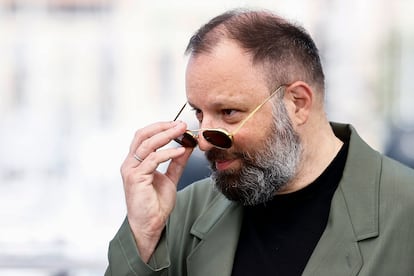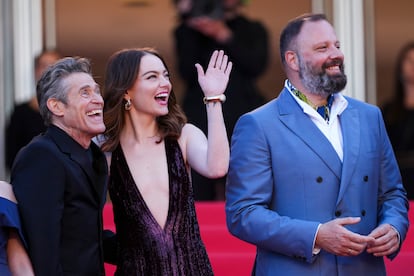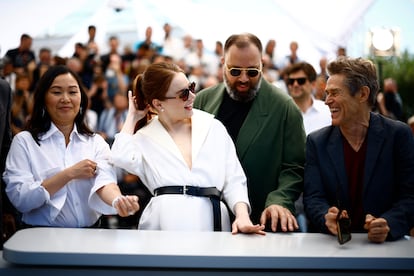Director Yorgos Lanthimos: ‘I never take things too seriously’
A passionate champion of Luis Buñuel, the Greek filmmaker teams up with Emma Stone again for ‘Kinds of Kindness’ after the success of ‘Poor Things’


After basking in red carpet glory for the premiere of Kinds of Kindness at the Cannes Film Festival, Greek director Yorgos Lanthimos, 50, is faced with the world’s press. The filmmaker sits with his hands on his knees and begins to respond pleasantly in his pristine English. When this EL PAÍS journalist refuses the offer of a drink from a female publicist, Lanthimos jokes: “Spaniards drink like Greeks.”
He looks relaxed despite a hectic stretch: the post-production of Poor Things, which took time due to the digital effects, allowed him to shoot Kinds of Kindness; the finishing of the latter coincided with the winning of the Golden Lion award last September at the 80th Venice International Film Festival. This was followed by a long awards season that ended with the Oscars, where his freaky combo of feminism and Frankenstein took four gongs out of the 11 it was nominated for. “I need a break,” he confesses. “But because the script for Kinds of Kindness had been building over the years, we were able to pre-produce and shoot quickly.”
Lanthimos’ career moves hand in hand with Emma Stone’s; the pair are making movies together for the third time. And that’s where this conversation begins.
Question. What does Emma Stone bring to your movies that other actresses can’t?
Answer. We’ve built a great relationship over time. We’ve gotten to know each other better and trust each other more. And that allows us to explore, to get to special places. She helps me, and I help her. Plus, we’re very similar. I never take things too seriously. Neither does she. We don’t sit for hours on set thinking about what we’re going to shoot, we just work.
Q. Are you aware that, with Emma, you are creating a new image of women in cinema?
A. Not consciously, no. I think that image has been there since cinema began. However, it is important to give it weight. I like to observe situations and start the stories from that point. Then you find the actors who adjust to those roles, and who have a direct relationship with the subject. I tend to get together with people who sail in the same direction, so that allows us to go further. When I have a character and am hesitating about whether it should be male or female, I tend to go for female. And that may be creating a specific image of women in my films. Call it a natural tendency. However, I never dictate how a woman should be, or lecture about it. I have never wanted to be didactic, but rather popular. I am happy if I can reach a large audience who make their own connection with the film.
Q. I suspect your material stems more from your interest in the human condition than in the story itself.
A. That’s true. I tend to observe, to analyze situations and behaviors before I start writing, even before I set up the structure. That’s why I like to reflect, add complexity and encourage questions before starting a synopsis. I’ve never started a script with just an interesting story... Sorry, sometimes it has been like that, but that’s been because that story was close to what I was reflecting on at the time.

Q. Mexican/Spanish filmmaker Luis Buñuel also focused on the human condition.
A. And that’s why I’m passionate about his films. I wish I could get a little bit closer to him. I love that his cinema is extremely funny, I love how he escapes convention — his audacity, his fight against structure while at the same time being an entertaining storyteller who doesn’t let the audience take anything for granted, particularly himself as a director.
Q. In Kinds of Kindness, there are two elements that form the backbone of the three stories: love and control. Is that what inspired the script [co-written with Efthimis Filippou, co-writer of Dogtooth, Alps, The Lobster and The Killing of a Sacred Deer]?
A. We started thinking about how we sacrifice a lot of things for faith. That’s how we wrote the first story. Well, that, and because I was inspired by reading Caligula, which says a lot about how a single individual can control the life and destiny of so many people. It may sound easier to achieve when one individual alone manipulates the masses, but we were drawn to a more individual concept: what it would be like in all its complexity for one person to control just one other person. See? Complexity. That matters. The situations thrown up by that first story suggested other routes to explore and from there we decided to play with the structure — the form, like Buñuel’s The Phantom of Liberty. We wrote down many ideas linked to specific situations, and from there we instinctively decided on two more. We put them together, and when we decided to use the same actors to play different characters in the three stories, it made the direction much clearer. So, in that sense, I have gone in the opposite direction to Buñuel when he made That Obscure Object of Desire. With that movie, he was a genius... eschewing practicalities. That’s why I like him so much. Anyway, we chose actors and so made the final connections between the three narratives.

Q. Isn’t working with Filippou a return to your roots in Dogtooth and Alp?
A. I’m not sure, because I’m always involved. And I’ve never stopped working with the different screenwriters I collaborate with; I mean, I’ve never left one for the other. And besides, in filmmaking, it’s very random. It’s almost never clear what the next project is going to be and even I myself sometimes don’t know what the next script I’ll finish will be. So that’s why there’s no plan to go back to my roots. My filmmaking life moves forward slowly and steadily, spending time on each path, going back and moving forward as each exploration takes place.
Q. Do you think there’s a problem in the world with faith?
A. It’s funny, because there’s as much lack of faith as there are extremist fanatics. And it’s probably different from a Western point of view than from an Eastern point of view. I wanted to delve into the confusion generated by misunderstood faith and how blind faith works.
Sign up for our weekly newsletter to get more English-language news coverage from EL PAÍS USA Edition
Tu suscripción se está usando en otro dispositivo
¿Quieres añadir otro usuario a tu suscripción?
Si continúas leyendo en este dispositivo, no se podrá leer en el otro.
FlechaTu suscripción se está usando en otro dispositivo y solo puedes acceder a EL PAÍS desde un dispositivo a la vez.
Si quieres compartir tu cuenta, cambia tu suscripción a la modalidad Premium, así podrás añadir otro usuario. Cada uno accederá con su propia cuenta de email, lo que os permitirá personalizar vuestra experiencia en EL PAÍS.
¿Tienes una suscripción de empresa? Accede aquí para contratar más cuentas.
En el caso de no saber quién está usando tu cuenta, te recomendamos cambiar tu contraseña aquí.
Si decides continuar compartiendo tu cuenta, este mensaje se mostrará en tu dispositivo y en el de la otra persona que está usando tu cuenta de forma indefinida, afectando a tu experiencia de lectura. Puedes consultar aquí los términos y condiciones de la suscripción digital.








































